So, you’re looking for a new mattress and want to know how the Saatva Classic and Casper mattresses compare. You’ve come to the right place. Both mattresses are popular, supportive, and are made by brands that are well-respected in the mattress industry. However, these mattresses have some key differences that could determine which one is right for you.
In this comparison, I’ll put these mattresses to the test and evaluate their feel, construction, and durability. I’ll also perform a variety of tests to determine how they perform in categories such as cooling, pressure relief, motion isolation, and more.
The Saatva Classic comes in three firmness models. For this comparison, I’ll be focusing on the Luxury Firm option. It also comes in Plush Soft and Firm.
Short on time? Click here to skip down to my comparison summary.
Saatva Classic vs Casper
Product
Firmness
Score
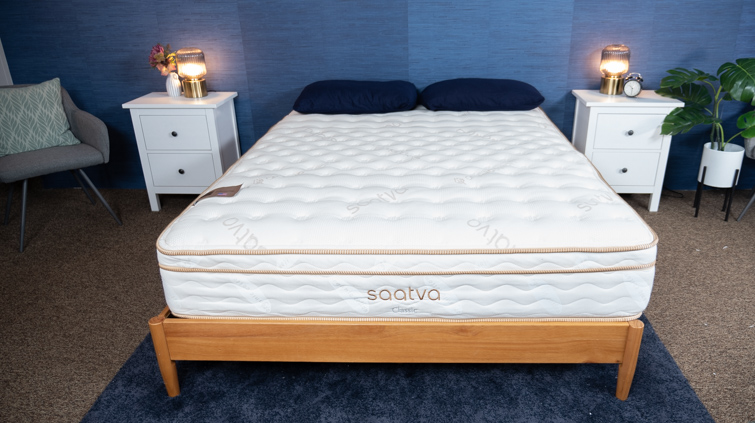
Product
Firmness
Score
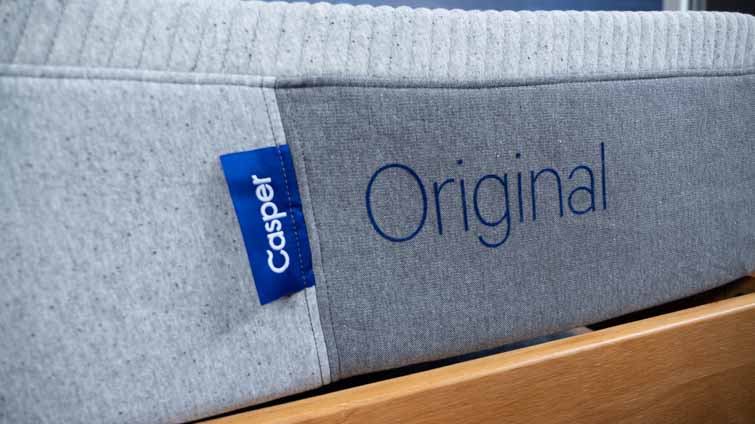
Product
Firmness
Score
Here’s a brief overview of the strong points of the Saatva and Casper, as well as which type of sleepers are best suited for them
| Saatva is best for… | Casper is best for… |
| Hot sleepers | Couples |
| Combination sleepers | Back pain |
| Innerspring lovers | Memory foam lovers |
Saatva vs Casper Comparison Video

Saatva vs Casper: Top Similarities
- Pain relief: Both mattresses excel at preventing pain, especially in the lower back.
- Support: The Saatva and Casper are both very supportive, and you’ll likely feel more “on” these beds than “in” them.
- Zoned support: These beds include a layer of zoned support memory foam. This means the foam’s firmness is softer in some areas and firmer in others to provide optimal support.
Saatva vs Casper: Top Differences
- Construction: The Saatva is an innerspring mattress containing two layers of coils, and the Casper is an all-foam mattress.
- Edge support: The Saatva has better edge support than the Casper.
- Motion isolation: The Casper has better motion isolation than the Saatva.
Saatva vs Casper: Construction & Feel Differences
Now that you know the main similarities and differences, let’s jump into how the Saatva and Casper mattresses feel. I’ve tested these mattresses for different feel factors, such as firmness, pressure relief, bounce, and sinkage.
Before we begin, I want to remind you that these factors are subjective and can change depending on the sleeper’s body size, shape, and weight.
What’s the Firmness Difference?
A mattress’s firmness can feel different depending on the sleeper. Because it’s so subjective, I always test firmness with a handful of coworkers who are all Certified Sleep Science Coaches. After laying on the mattress in different positions, we each give the mattress a rating from 1 to 10, with 1 being the softest and 10 being the firmest. A 6.5 is our standard score for a medium-firm mattress. After we’ve all rated the mattress, I calculate the average to create our final firmness rating.


The Saatva Classic is offered in three firmness models: Plush Soft, Luxury Firm, and Firm. For this comparison, we’ll be focusing on the Luxury Firm model. We gave this mattress a rating of 6.5 out of 10 on the mattress firmness scale, making it a true medium-firm mattress. There’s a bit of immediate softness from the Euro pillow top, and then some firm support from the coil on coil construction.
We rated the Casper a 7 out of 10 on the mattress firmness scale. This is still a medium-firm bed, but leans towards the firmer side. The mattress is constructed with three layers of foam to provide both pressure relief and lift. The zoned support foam is a bit softer at the shoulders and firmer at the hips.
What Does Each Mattress Feel Like?
Now that we know how firm these mattresses are, let’s discuss how it feels to sleep on them.
As an innerspring mattress, the Saatva has a bouncy and responsive feel that’s easy to move around on. The quilted Euro pillow top provides a bit of cushioning and pressure relief at the hips and shoulders, but I wouldn’t call it deep sinkage. The sturdy coil-on-coil construction kept my body lifted, and I felt more “on” the bed than “in” the bed. In between the two coil layers is a layer of zoned support foam. The foam gave the coils something to bounce off of and helped evenly distribute my weight.
The Casper felt pretty soft when I first laid down on it, however, it felt firmer once the foams adjusted to my weight. The foam was soft to the touch, and I liked the way it contoured my body while still keeping me lifted and supported. Even without coils, I felt very stable on this bed and didn’t feel like I was sinking in too far. I especially liked the layer of zoned support foam. This foam was softer at the shoulders, so I was able to experience some pressure relief in that area. The same foam was firmer at the lower back and gave the bed extra lift to help with spinal alignment.
How Does The Construction Differ?
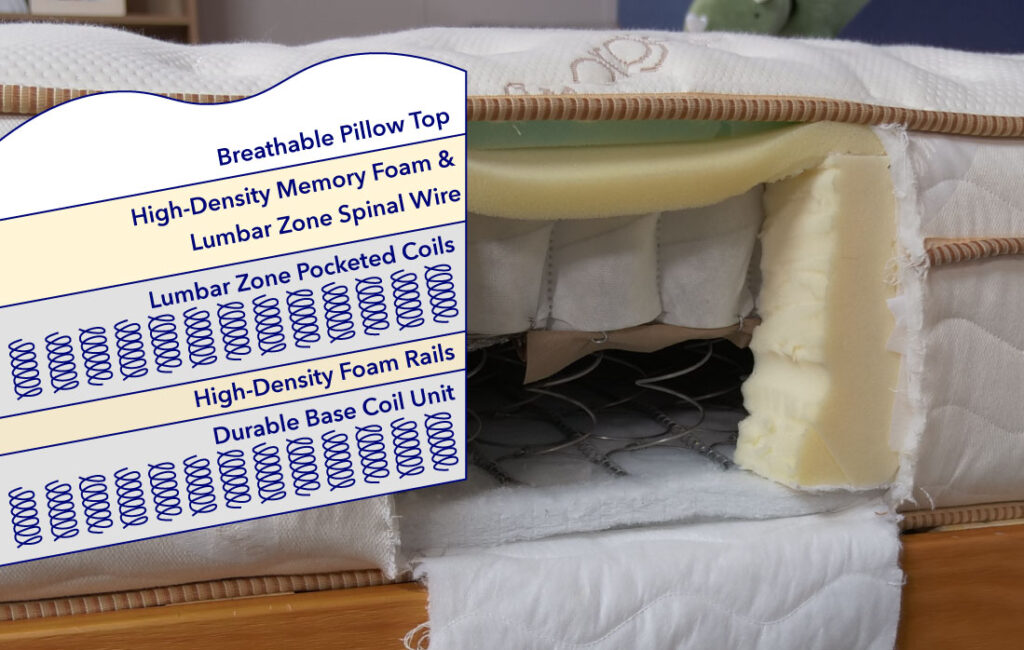
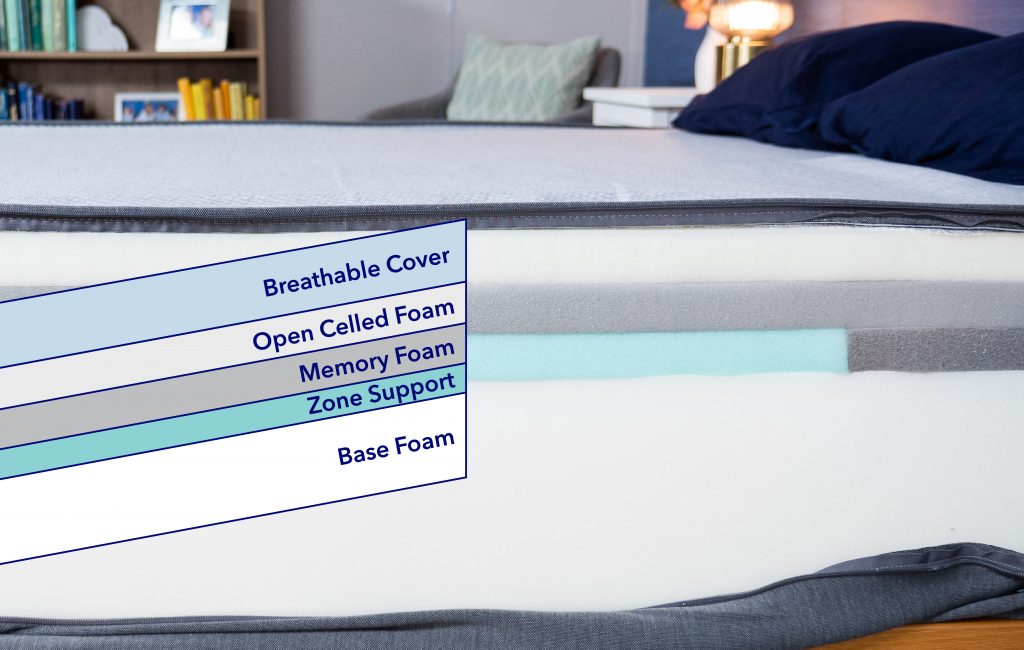
Saatva vs Casper Per Body Type
As I mentioned earlier, a mattress can feel very different to sleepers depending on their body type and preferred sleeping position. Let’s take a look at how the Saatva and Casper may feel for different sleepers.
Saatva Mattress
| Body Weight | Side | Back | Stomach |
|---|---|---|---|
| Light (under 130 lbs) |
unpleasant | good | good |
| Average (130-230 lbs) |
good | excellent | good |
| Heavy (over 230 lbs) |
unpleasant | excellent | unpleasant |
| Body Weight: Light (under 130 lbs) | |
|---|---|
| Side Sleeper | unpleasant |
| Back Sleeper | good |
| Stomach Sleeper | good |
| Body Weight: Average (130-230 lbs) | |
| Side Sleeper | good |
| Back Sleeper | excellent |
| Stomach Sleeper | good |
| Body Weight: Heavy (over 230 lbs) | |
| Side Sleeper | unpleasant |
| Back Sleeper | excellent |
| Stomach Sleeper | unpleasant |
Casper Mattress
| Body Weight | Side | Back | Stomach |
|---|---|---|---|
| Light (under 130 lbs) |
unpleasant | excellent | excellent |
| Average (130-230 lbs) |
excellent | excellent | unpleasant |
| Heavy (over 230 lbs) |
good | unpleasant | unpleasant |
| Body Weight: Light (under 130 lbs) | |
|---|---|
| Side Sleeper | unpleasant |
| Back Sleeper | excellent |
| Stomach Sleeper | excellent |
| Body Weight: Average (130-230 lbs) | |
| Side Sleeper | excellent |
| Back Sleeper | excellent |
| Stomach Sleeper | unpleasant |
| Body Weight: Heavy (over 230 lbs) | |
| Side Sleeper | good |
| Back Sleeper | unpleasant |
| Stomach Sleeper | unpleasant |
Saatva vs Casper Comparing Mattress Performance
Here at Sleepopolis, our team of Certified Sleep Science Coaches put every mattress we review through a series of tests. These tests help give us an objective view of who these mattresses could be good for, as well as what it’s like to sleep on them every night. Below, I’ll discuss how the Saatva and Casper performed on tests like cooling, motion transfer, edge support, and more.
Temperature
When I evaluate cooling, I first take a peek at the mattress’s construction. The Saatva has not just one coil layer, but two coil layers that provide the mattress with plenty of airflow. These coils put in the work to make this bed super breathable. I next used a thermal gun to measure how much the mattress heated up after laying on it for 15 minutes. I found that the Saatva heated up 9.3 degrees, which shows decent cooling abilities. While laying on it, the Saatva felt pretty cool, so I would recommend it to hot sleepers.
All-foam mattresses tend to trap heat within their layers, as there’s not a lot of space for air to escape. Because of this, I had low expectations for Casper’s cooling abilities. The Casper has a layer of proprietary Airscape foam that has small aerations along its surface to help release trapped heat. When using the thermal gun, the Casper’s temperature increased by 8.4 degrees. This indicates decent cooling, but foam mattresses have such a hard time staying cool, especially when they don’t have cooling technology (such as gel-infused foam). The Casper could be cool enough for some sleepers, but especially hot sleepers may want a more cooling mattress.
Motion Isolation
If you share the bed with a partner or pet, you might be familiar with sleep disturbance from their tossing and turning. A bed with low motion transfer might be ideal for these sleepers, as it’s able to isolate motion on one side of the bed and prevent the sleeper on the other side from feeling it. All-foam mattresses are typically the best at absorbing motion, while mattresses with coils are bouncier and are prone to high motion transfer. We test motion transfer using three tests: a human test, a wine test, and a seismometer test.
The human test is pretty straightforward– I simply lay on one side of the mattress and have a colleague move around on the other side. I then see if I can feel them moving or not. On the Saatva, I could definitely feel my colleague tossing and turning and getting in and out of bed. Our wine test involves placing a glass of wine on one side of the bed and moving around on the other side. We then observe the liquid and see how much it moves. The wine splashed around a bit when performing this test on the Saatva, but the glass didn’t spill over. Finally, I dropped a 10-pound steel ball onto the Saatva from three different heights and used a seismometer to measure the disturbance levels. The lines on the graph show how much of an impact the steel ball made. As you can see on the graph above, there is a decent amount of spiking, which indicates high motion transfer. Overall, I’d say the Saatva’s motion isolation is very average, which isn’t surprising considering the two layers of coils inside.
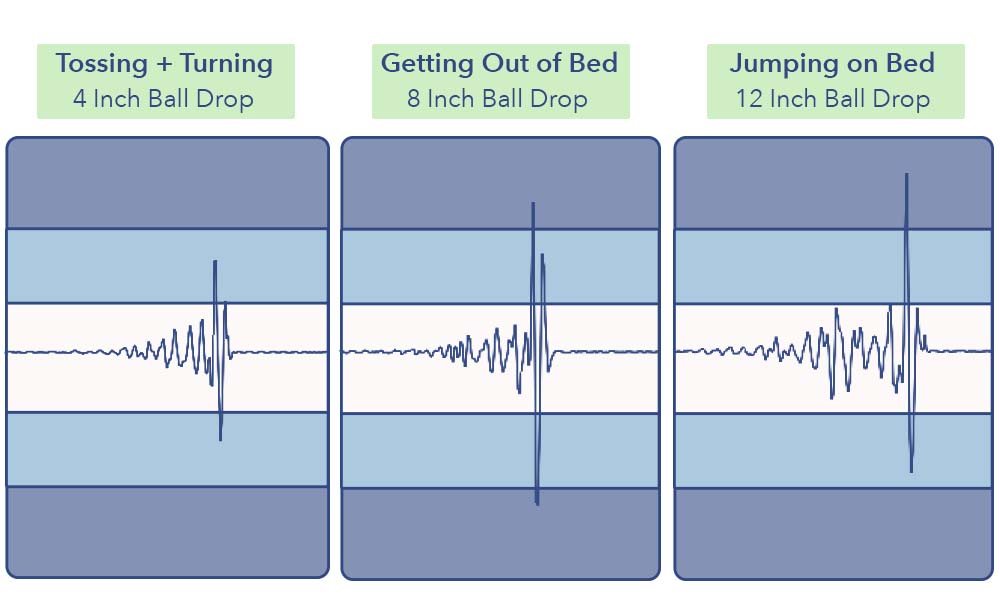
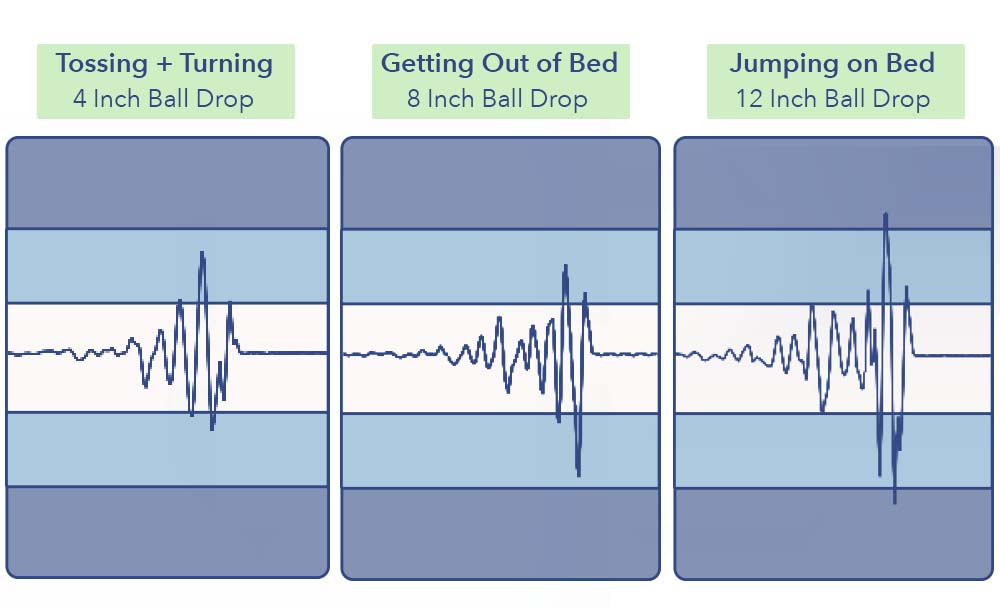
When performing the human test on the Casper, I could detect slight movement from my colleague on the other side, but not enough to be concerning. I doubt I would have woken up if I was asleep. During the wine test, the liquid in the glass moved a bit, but it wasn’t sloshing too much and the glass seemed steady; I didn’t feel like it was about to tip over. Finally, I performed the seismometer test on the Casper. Looking at the graph above, the lines aren’t too large. These are overall great results, and I think the Casper does a really good job at isolating motion. You may feel some larger movements, such as getting in and out of bed, but I don’t foresee major sleep disturbances on this mattress.
Edge Support
Edge support refers to how strong a mattress is along its perimeter. A mattress with solid edge support will feel just as sturdy when sitting or sleeping near the edge as it does in the center. Edge support can also be an indicator of whether a mattress is prone to premature sagging. Couples, or anyone that simply likes to spread out, can appreciate a mattress with good edge support because it allows you to use the entire surface of the mattress, making the mattress feel larger.
I was extremely impressed with the edge support on the Saatva mattress. In fact, I think the Saatva has the best edge support out of all the mattresses I’ve reviewed (and I’ve reviewed quite a lot). When sitting on the edge, the mattress sank less than an inch under my weight. This is likely due to the reinforced edge support system that combines steel coils with firm polyfoam to create a strong perimeter.
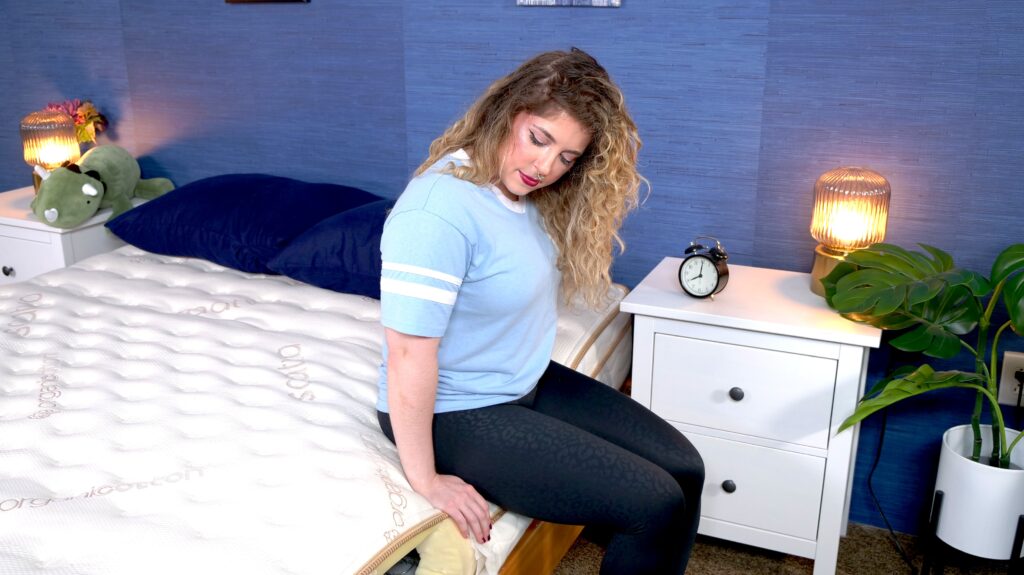
Foam beds typically have weaker edge support because there are no coils to add additional lift. However, I think the edge support on the Casper was pretty good considering its construction. The mattress sank quite a bit when I sat on the edge, but I felt pretty stable when laying on the edge. Despite the sinkage, I didn’t feel like I was about to fall off the bed, which is always nice to see.
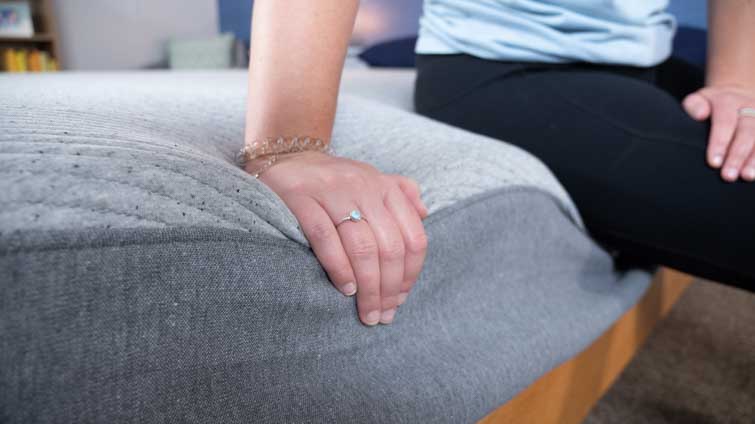
Pressure Relief
We test pressure relief using a specialized mat that senses pressure. We begin by rolling the mat onto the mattress and laying down on it in different sleeping positions. The mat then translates the pressure into an easy-to-read graphic using thermal imaging. Areas displaying blue and green indicate low pressure, and areas with red and yellow indicate high pressure.
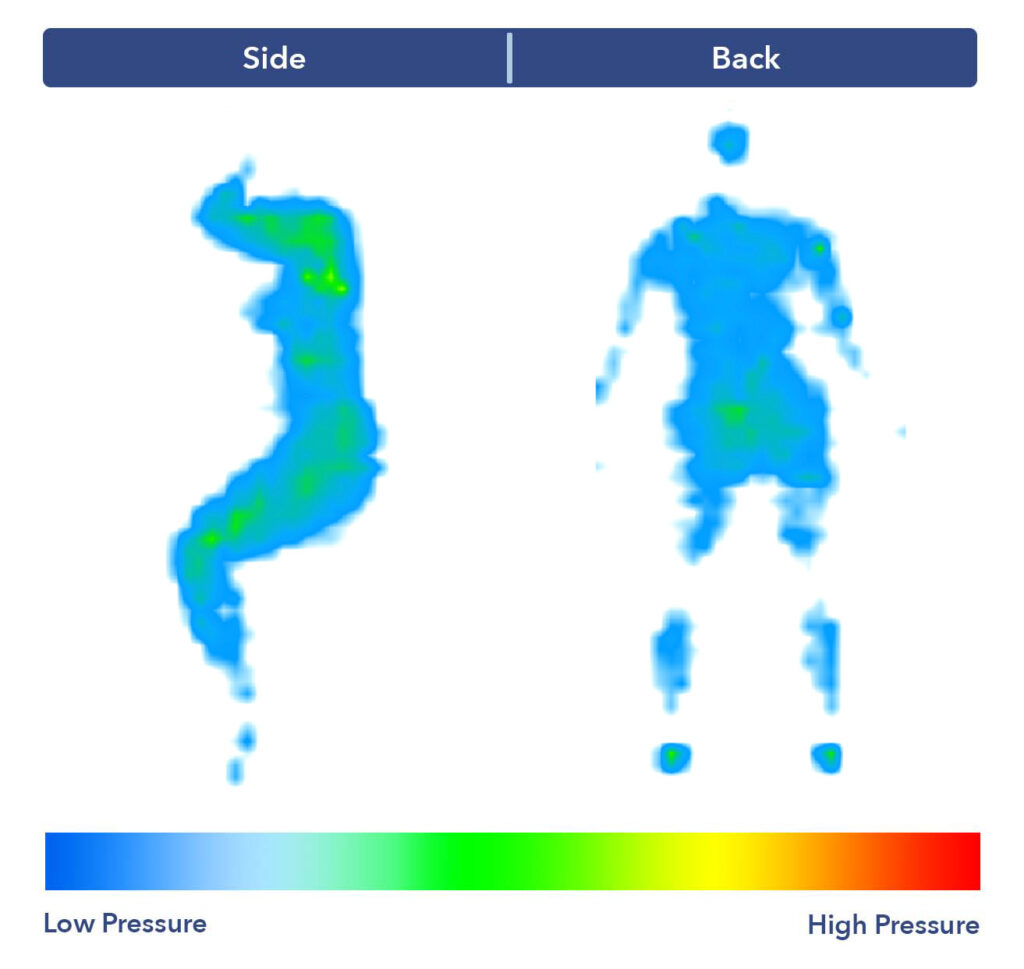
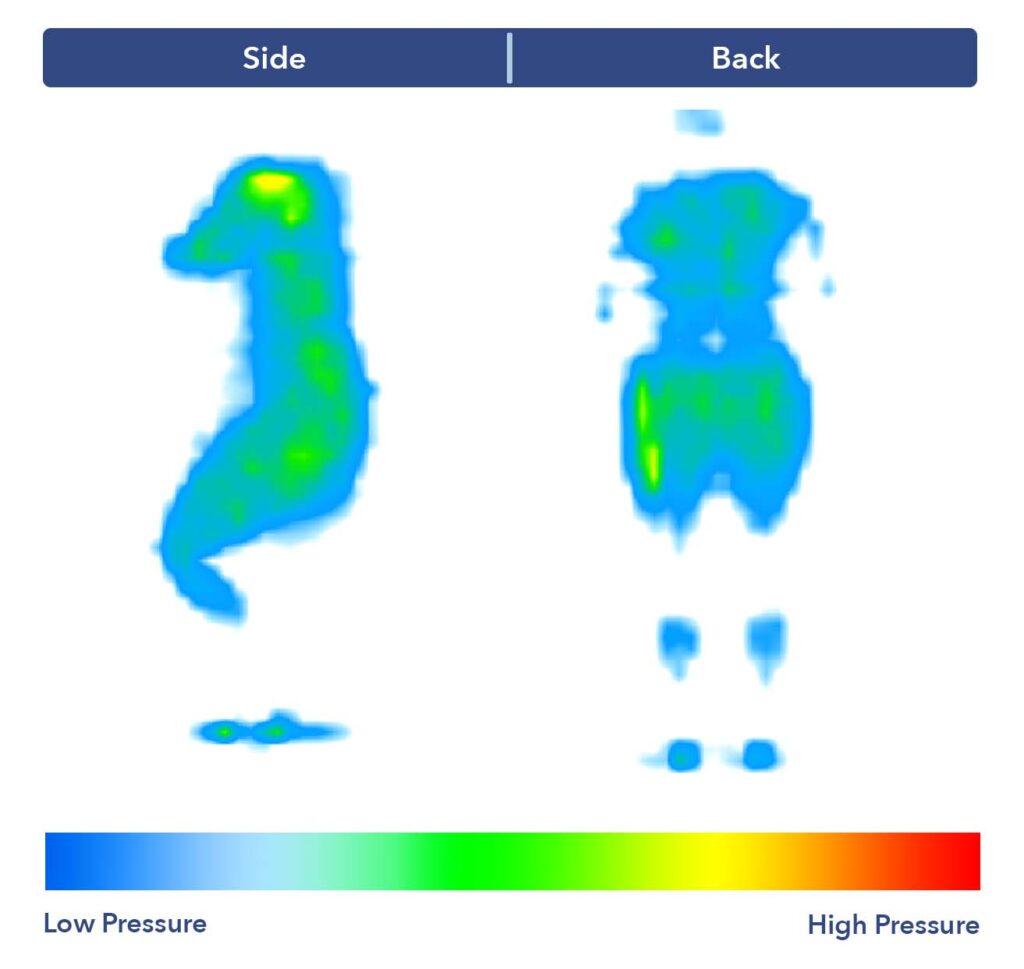
As you can see on the pressure map, the Saatva has pretty low pressure buildup, especially in the back region. We’re facing mostly blue and green on the map, which is a good indicator that pressure buildup won’t be an issue on this mattress. There’s a bit of green at the hips, but this color still indicates low pressure, and I don’t foresee it being a major issue.
Looking at the Casper’s pressure map, we see a lot of blue and green. I’m happy with the large amount of blue in the lumbar region. However, I am spying a bit of yellow at the shoulders and hips, which indicates a bit of pressure building up there.
Pain Relief
If we want to know whether or not a mattress can reduce pain, we can take another look at the pressure maps above. If there’s a lot of pressure building in a certain area, it’s likely that you’ll begin to experience pain there over time. Likewise, low pressure buildup indicates that you’ll probably find some relief from existing pain and you’re unlikely to develop new pain.
The Saatva does a great job at relieving back pain, and I think sleepers struggling in this area could feel comfortable on this mattress. Although there’s a small amount of pressure building at the hips and shoulders, I don’t think it’s enough to cause new aches and pains. However, people with preexisting hip or shoulder pain may not find enough relief on this mattress and may prefer one of our best mattresses for hip pain or shoulder pain.
Like the Saatva, the Casper does an excellent job at relieving back pain. However, I’m concerned about the pressure buildup at the hips and shoulders. I think most sleepers should sleep fine and not experience hip or shoulder pain, but I’m worried that people with sensitive joints or preexisting pain won’t be comfortable on this mattress. I would steer these folk towards one of our best mattresses for hip pain or shoulder pain.
Durability
The quality and construction of a mattress’s materials can tell us a lot about its durability. Edge support can also be a durability factor, as it can help us predict whether or not the mattress may sag over time. Finally, we can take a quick look at the mattress warranty, as this will provide some insight into how long the brand expects the bed to last.
I would consider the Saatva to be a very durable mattress. The materials inside the mattress are super high-quality, and they should last a long time without deteriorating. The two coil layers and reinforced edge support confirm that this bed is unlikely to sag over time. Finally, all Saatva mattresses come with a lifetime warranty, so the brand seems confident that the mattress will last you a long time.
I think the Casper is a durable mattress, but I don’t think it’s quite as durable as the Saatva. Although the Casper is made with high-quality and durable materials, the lack of edge support leads me to believe this mattress may sag over time. Casper mattresses come with a 10-year limited warranty, which isn’t a lifetime guarantee but is still pretty solid.
Company Policies
Saatva Policies
- Trial Period – 365-night sleep trial
- Shipping – Free white glove delivery
- Mattress Warranty – Lifetime warranty
Casper Policies
- Trial Period – 100-night sleep trial
- Shipping – Free shipping
- Mattress Warranty – 10-year warranty
Saatva Sleepopolis Customer Service Rating
- Stellar: Saatva has many channels to access a customer service representative, from immediate online chat to email and phone assistance. I found their customer service reps to be polite, quick to respond, and knowledgeable about Saatva products and policies. Saatva also offers free white glove delivery with each mattress purchase, so a team of workers will arrive at your home and set the mattress up for you.
Casper Sleepopolis Customer Service Rating
- Great: I was overall happy with Casper’s customer service. I used the chat function on the Casper website and was quickly provided with a response to my question. However, I was sent a link rather than a direct answer, and it would have been nice to chat with a customer service representative. Casper also offers customer support via phone and email.
Comparing Saatva vs Casper Price
Take a look at the chart below for pricing info on these beds! Make sure to use the Sleepopolis Saatva mattress coupon or Casper mattress coupon to save on your purchase. Prices listed will be before discount or offer for each size.
| Size | Casper | Saatva |
|---|---|---|
| Twin | $595 | $887 |
| Twin XL | $695 | $1,087 |
| Full | $995 | $1,474 |
| Queen | $1,095 | $1,574 |
| King | $1,295 | $1,974 |
| California King | $1,295 | $1,974 |
Saatva Classic vs Casper
Product
Firmness
Score

Product
Firmness
Score

Product
Firmness
Score
Other Saatva and Casper Mattress Comparisons
Want even more info on these mattress brands? Take a look at a few other mattress comparisons below.
Saatva vs
- Saatva vs Beautyrest
- Saatva vs Loom & Leaf
- Saatva vs Purple
- Saatva vs Aireloom
- Saatva vs Allswell
- Saatva vs. WinkBeds
Casper vs
- Casper vs Leesa
- Casper vs Purple
- Casper vs Tuft & Needle
- Casper vs Nectar
- Casper vs Helix
- Casper vs WinkBeds
- Casper vs DreamCloud
- Casper vs Endy
- Casper vs Lull
- Casper vs Puffy
- Casper vs Layla
- Casper vs Brooklyn Bedding
Comparing Other Mattress Models
Saatva vs Casper Frequently Asked Questions
How do the Saatva and Casper mattresses ship?
The Saatva mattress ships free and comes with free white glove delivery, so a team of Saatva workers will come to your home and set up the new mattress for you and dispose of your old one. The Casper also ships free and arrives compressed in a box at your door.
Are the Saatva and Casper mattresses good for hot sleepers?
Both mattresses could be decent options for hot sleepers, but the coils in the Saatva make it a bit more breathable and allow for more airflow.
Is the Saatva firmer than the Casper?
No. In fact, the Casper is actually a bit firmer than the Saatva.
What are the return policies for the Saatva and Casper mattresses?
Saatva accepts returns within their 365-night trial period, but you’ll have to pay a $99 processing fee. Casper accepts returns 30 days after delivery and before the 100-night trial period ends.
What is a sleep trial?
A sleep trial is the number of days a company allows you to try out a mattress before returning it. In this case, Saatva allows customers to sleep on their mattresses for up to 365 nights before becoming ineligible for returns. Casper has a shorter sleep trial of 100 nights.
As we near the end of this review, I want to mention some of my favorite things about the Saatva and some of my least favorite.
We’re almost done with this review, so allow me to leave you with a few highlights and complaints.
Our Review Process
Our Sleepopolis reviewers personally test each mattress. We start by unboxing the mattress to figure out how difficult (or easy) it is to get the mattress from the box to the bed. Then, we spend time laying on the bed in different positions, taking time to assess it on our backs, stomachs, and sides. Next, we perform our Sleepopolis tests, using specialized tools to measure qualities like motion transfer, bounce, and pressure relief. Our last step is to open up the mattress and take a look at each layer. These steps allow us to give our final verdict on the mattress. Jump back to our mattress picks.

Logan Block
Former Content Director
About Author
Logan is the former content director of Sleepopolis. As content director, he reviewed new mattresses every week and curated the comparisons, best of pages, and video guides on the site. Logan perfected his method by personally testing over 200 different mattresses, so he’s not only able to discern the overall vibe of a specific bed, but to contextualize its feel within the bed-in-a-box market as a whole.
Back Sleeper



























